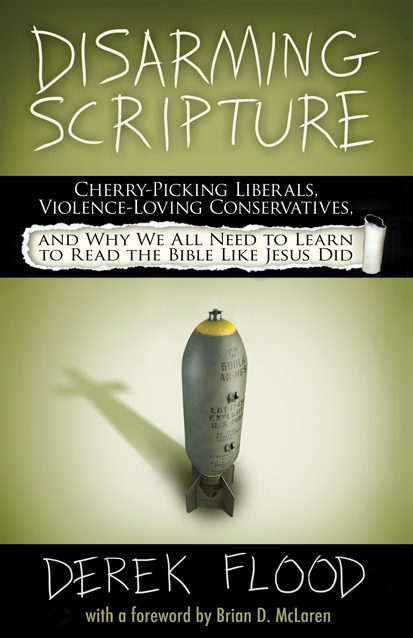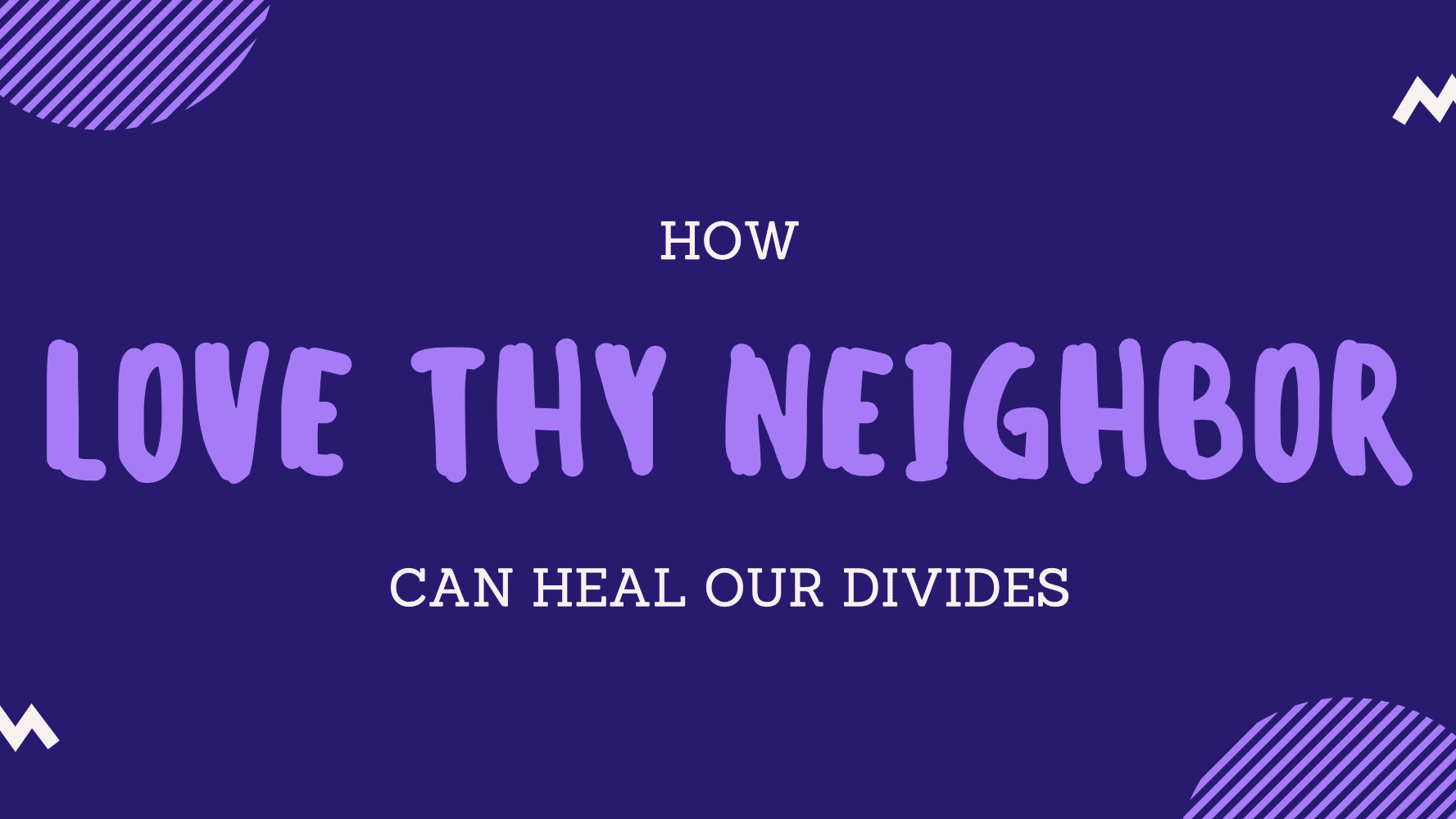Evangelical theology is undergoing a major reformation. In this period of reformation and renewal, many fresh voices are rising to the surface and are helpin g challenge the presuppositions of both conservatives and progressives, calling us all to a more Christ centered reading of the Scriptures. Among the most impressive of these voices is Derek Flood, an artist and theologian who has been making substantial waves along the outskirts of the evangelical movement with his challenging and accessible theology. Dereks first book, Healing the Gospel, was an absolute game-changer in my personal theology, helping me to shed images of God that were centered on wrath and retribution and discovering the true heart of the Gospel, a self-sacrificing Prince of Peace. In Dereks new book, Disarming Scripture, released early last week, he helps both “cherry picking liberals” and “violence loving conservatives” learn to read the Bible like Jesus.
g challenge the presuppositions of both conservatives and progressives, calling us all to a more Christ centered reading of the Scriptures. Among the most impressive of these voices is Derek Flood, an artist and theologian who has been making substantial waves along the outskirts of the evangelical movement with his challenging and accessible theology. Dereks first book, Healing the Gospel, was an absolute game-changer in my personal theology, helping me to shed images of God that were centered on wrath and retribution and discovering the true heart of the Gospel, a self-sacrificing Prince of Peace. In Dereks new book, Disarming Scripture, released early last week, he helps both “cherry picking liberals” and “violence loving conservatives” learn to read the Bible like Jesus.
Though I could write for pages about the insights contained in this book, I have been asked to focus specifically on Chapter 9, called “Undoing Judgement”. In this chapter, Derek zeros in on the tough question of the use of violence by God as a means of judgement and the clear teachings of Jesus to love our enemies and withhold judgement and violence. Over the course of the chapter, themes such as the doctrine of hell, violent language in the Gospel of Matthew, paradox in Jesus’ parables, and the practice of transferring our violence to God in order to feel a sense of vindication are discussed and examined in order to reveal a coherent method of reading the scriptures, in their context, in a way that unveils a clear trajectory of grace and peace instead of judgement and violence.
The most compelling part of the chapter, for me, was Floods interaction with the theology of Miroslav Volf, who asserts that “the only way to sustain a commitment to nonviolence in a violent world is not by reliquishing our desire for retribution and violence, but instead by differing and transffering these to God.” (pg. 212) Frankly, I was very surprised that a scholar such as Volf would ever articulate such a position, though such a position is one of the most prominent perspectives in the Christian world today. Instead of engaging in violence and retribution ourselves, we, like the people of Israel, cling to the idea that God will one day vent his wrath on all those who have perpetuated injustice against “us”- his righteous remnant. This perspective provides a sense of cathartic relief to us, because though we ourselves may not see or execute judgement on our “enemies”, we are able to cling to the hope and image of God’s judgement on them.This position helps create room for pacifism to begin to emerge in the minds of believers, but ultimately undermines the image of God reveleaed to us in Christ.
Flood critiques this view saying that it is easy to understand why someone like Miroslav Volf might be compelled to hold such a position.
“Its hard not to hear pain behind Volf’s words. I do not imagine that I can comprehend the suffering and lose that he or others who have endured the horrors of war have undergone. However, I do believe that there is a better message that we could give to those in the war torn land than the hope of divine retaliation…It is possible to change the minds and wills of abusive people in a nonviolent and non-coercive way… by developing empathy and self-refletion, which in turn, changes their perception of the world around them, their awareness of others, and in turn their ability to navigate interpersonal conflict in socially appropriate ways rather than resorting to violence.” (pg. 215-216)
Flood suggests that by turning inward, and looking at our own internalized pain and hurt, as well as empathizing with others, we can pass from a posture of judgement and condemnation to that of grace and restoration.Throughout the remainder of the chapter, Flood makes the case that the New Testament lays out a clear and radical rejection of violence by humans. Through reexamining the message and methods of Christ, Flood shows that the very core of the Gospel is an apocolyptic vision of peace on earth. Using the Gospel of Matthew as the primary text, he clearly displays how Matthew uses language and images of judgement and retribution to urge his readers, through Jesus, to renounce violence and embrace the way of the cross. Flood unpacks the idea of progressive revelation, the notion that God is continually calling humanity into further progression towards the Kingdom of God. He beautifully notes:
“Just as we find in the New Testament a less than ultimate view of slavery, we likewise find in places a less than ultimate view of God. Seeing this as the first steps along a trajectory, we can appreciate the bold move expressed in the New Testaments unanimous rejection of human participation in violence in Gods name, while at the same time recognizing that their application of Christ revelation of God’s true nature needs to faithfully be taken further by us today- abolishing slavery, ending child abuuse, finding better ways to deal with crime and international conflict, and finally understanding God’s true nature is revealed in Christlike enemy love, not in violent retribution.” (pg 220-221)
This beautiful theology of progressive revelation undergirds much of Floods theology articulated in this book and provides a tremendous framework for understanding and obeying the message and teachings of Jesus in our modern context.
Derek Flood’s new book Disarming Scripture will prove to be a helpful and indeed, a transformative resource for all of those who are struggling to faithfully divide the word of God using Christ as their primary hermeneutic lens. Much in this book will offend conversatives and make liberals uncomfortable. But it is clear the Flood has unlocked the often suppressed power of the Scripture through reading it in the light of Christ. And that is a gift that will transform lives and spur on the expansion of God’s Kingdom on earth as it is in heaven.
More Information on Disarming Scripture by Derek Flood:
Description: For many Christians the problem of violence in Scripture can result in a crisis of faith–especially when we see how such passages have been used throughout history to justify horrific bloodshed in God’s name. Moving beyond typical conservative and liberal approaches, which seek to either defend or whitewash over violence in the Bible, Disarming Scripture takes a surprising yet compelling approach: Learning to read the Bible like Jesus did.
Along the way the book deals with some very big issues, ranging from passages commanding genocide and infanticide in the Old Testament to passages in the New Testament that have been used to justify slavery, child abuse, and state violence. The take-away is an approach to Scripture that not only sees questioning as an acceptable part of a healthy faith, but as an absolutely essential part of it.
Endorsements:
“A perceptive and honest book about the vexed question of violence in the Bible. Taking with great seriousness the dynamism of the biblical tradition and the interpretive process, the distinctive contribution of Disarming Scripture is an exploration of the way in which the biblical text itself interprets texts of violence. This is a fine contribution to our common work.”
—Walter Brueggemann, Emeritus professor, Columbia Theological Seminary, and author of The Prophetic Imagination
“Jesus is the savior of everything–including the Bible! That’s what I kept thinking while reading this brilliant book. There have been a number of excellent books in recent years on how Christians should read the Bible, but Disarming Scripture is the very best. Derek has done us an immeasurable service in showing us how to read the Bible like Jesus did.”
—Brian Zahnd, Pastor of Word of Life Church, and author of A Farewell to Mars
“A morally responsible, dynamic reading of scripture, where Jesus and Paul move us along a trajectory toward a non-violent God and a non-violent people of God. Flood leaves no stone unturned in presenting his case with remarkable subtlety in an easy-reading style, handling biblical violence with bracing honesty and spiritual and intellectual substance.”
—Peter Enns, Professor of Biblical Studies, Eastern University and author of The Bible Tells Me So
“Disarming Scripture shows us how we can confront difficult passages in the Bible which seem to condone or even command violence. Recommended to anyone who seeks to reconcile the violence of the Old Testament with Jesus’ commandment to love our enemies.”
—Jim Wallis, president of Sojourners, author of The UnCommon Good
“Having been Derek’s friend and a believer in his work for several years now, I expected this book to be good. But it is even better than expected. You need Derek Flood. You need his intelligence. You need his faithfulness. You need his courage. You need his message in this book. So do I.”
—Brian D. McLaren, Speaker, pastor, activist, and author of We Make the Road By Walking
“Disarming Scripture may well be the most thought-provoking and liberating book about the Bible that you will ever read. How do we reconcile a God of grace and compassion with the one who sanctions violence and killing? Far from shying away from these and many other important questions, Derek Flood demonstrates not only how the prophets and Jesus himself often questioned scripture–but shows us why we have a responsibility to do exactly the same.”
—Steve Chalke MBE, Founder, Oasis Global and Author of The Lost Message of Jesus
To purchase Disarming Scripture via Amazon, click here. To visit Derek Flood’s Blog, Rebel God, click here.











